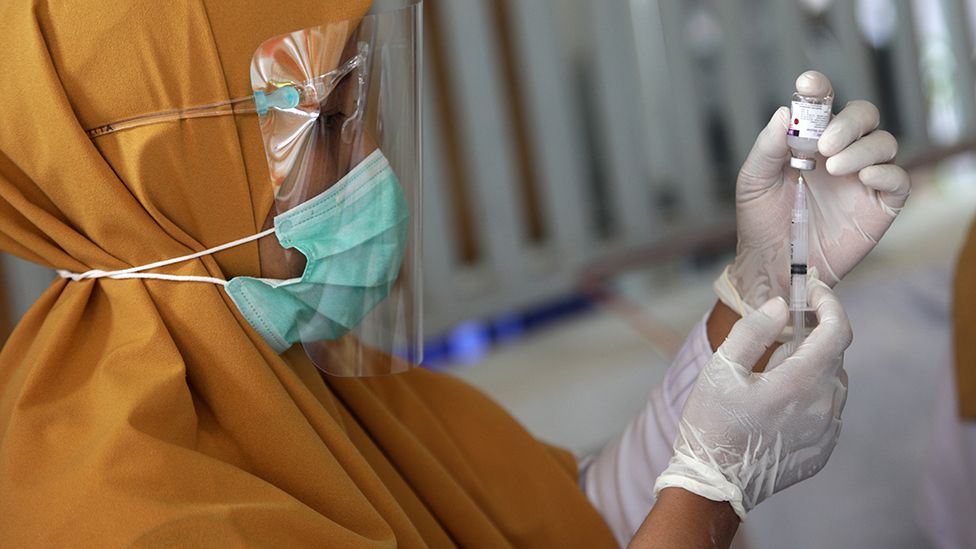Rich countries hoarding Covid vaccines, says People's Vaccine Alliance
- Published
- comments

Rich countries are hoarding doses of Covid vaccines and people living in poor countries are set to miss out, a coalition of campaigning bodies warns.
The People's Vaccine Alliance says nearly 70 lower-income countries will only be able to vaccinate one in 10 people.
This is despite Oxford-AstraZeneca pledging to provide 64% of its doses to people in developing nations.
Steps are being taken to ensure access to vaccines is fair around the globe.
This vaccine commitment, known as Covax, has managed to secure 700 million doses of vaccines to be distributed between the 92 lower-income countries that have signed up.
Five challenges of distributing a Covid-19 vaccine around the world.
But even with this plan in place, the People's Vaccine Alliance - a network of organisations including Amnesty International, Oxfam and Global Justice Now - says there is not enough to go round, and drug companies should share their technology to make sure more doses are produced.
Their analysis found that rich countries have bought enough doses to vaccinate their entire populations three times over if all the vaccines are approved for use.
Canada, for example, has ordered enough vaccines to protect each Canadian five times, it claims.
And even though rich nations represent just 14% of the world's population, they have bought up 53% of the most promising vaccines so far, according to data from eight leading vaccine candidates in Phase 3 trials that have done substantial deals with countries worldwide.
"No-one should be blocked from getting a life-saving vaccine because of the country they live in or the amount of money in their pocket," said Anna Marriott, Oxfam's health policy manager.
"But unless something changes dramatically, billions of people around the world will not receive a safe and effective vaccine for Covid-19 for years to come."
The People's Vaccine Alliance is calling on all pharmaceutical corporations working on Covid-19 vaccines to openly share their technology and intellectual property so that billions more doses can be manufactured and made available to everyone who needs them.
This can be done through the World Health Organization Covid-19 technology access pool, it says.
90-year-old woman first to get Pfizer vaccine
The Pfizer-BioNTech vaccine has already received approval in the UK and the most vulnerable are starting to be vaccinated this week. It is likely to receive approval from regulators in the US and Europe soon.
Two other vaccines, from Moderna and Oxford-AstraZeneca, are awaiting regulatory approval in a number of countries.
The alliance says that, so far, all of Moderna's doses and 90% of Pfizer/BioNTech's have been acquired by rich countries.
AstraZeneca, the company manufacturing the Covid vaccine developed by the University of Oxford, has committed to making it available on a not-for-profit basis to the developing world.
It is cheaper than the others and can be stored at fridge temperatures, making it easier to distribute across the globe.
While the alliance called this "a welcome contrast", it said Oxford/AstraZeneca could "still only reach 18% of the world's population next year at most" and "demonstrates that one company alone cannot hope to supply the whole world".
The Russian vaccine, Sputnik, has also announced positive trial results, and four other vaccines are going through late-stage clinical trials.
Meanwhile, shipments of Beijing-based biopharmaceutical company Sinovac's Covid-19 vaccine Coronavac have arrived in Indonesia in preparation for a mass vaccination campaign, even though it is yet to finish its late-stage trials. The firm has also secured deals with Turkey, Brazil and Chile.
- VACCINE: Will we get our old lives back?
- EDUCATION: How to be an online student
- EASY STEPS: How to keep safe
- HOPE AND LOSS: Your coronavirus stories
Related Topics
- Published8 December 2020
- Published9 December 2020